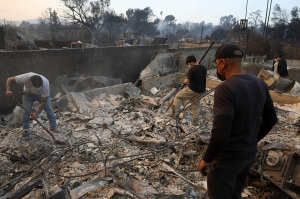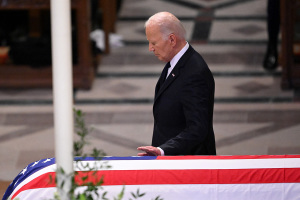Obama Seeking Sen. John McCain's Support to Strike Syria
President Barack Obama is hoping to gain the support of former Republican presidential nominee Sen. John McCain (R-Ariz.) when he meets with him on Monday, as part of his effort to win Congressional approval for a military strike on Syria.
"Monday's meeting with McCain is meant to address concerns of those who feel Obama isn't doing enough to punish Syrian President Bashar Assad's government for an attack in the Damascus suburbs last month that the U.S. says included sarin gas and killed at least 1,429 civilians, more than 400 of whom were children," The Associated Press noted in a report on Monday. "On the other side of the spectrum, some Republican and Democratic lawmakers don't want to see military action at all."
McCain spent over five years as a prisoner of war in north Vietnam before becoming a U.S. Congressman and beginning his Senate career in 1987. He won the Republican presidential nomination in 2008 and had faced off with Obama in the general election, but lost.
The Obama administration will be hoping to gain McCain's support, who is regarded as a foreign policy expert, in its attempt to convince the U.S. Congress and the American people that military action is needed in Syria against Assad, whose government is being blamed for carrying out the chemical attacks.
In a joint statement on Sunday, McCain and fellow Senator Lindsey Graham (R-S.C.), who is also being invited to the White House to speak with Obama, said that they believe the president is correct in his determination that the Assad regime used chemical weapons and that that requires a military response from the US.
"However, we cannot in good conscience support isolated military strikes in Syria that are not part of an overall strategy that can change the momentum on the battlefield, achieve the President's stated goal of Assad's removal from power, and bring an end to this conflict, which is a growing threat to our national security interests," the statement continued.
"Anything short of this would be an inadequate response to the crimes against humanity that Assad and his forces are committing. And it would send the wrong signal to America's friends and allies, the Syrian opposition, the Assad regime, Iran, and the world – all of whom are watching closely what actions America will take."
Secretary of State John Kerry said on Sunday that U.S. intelligence has produced strong evidence that the Syrian government is responsible for the attacks:
''We know that the regime ordered this attack,'' Kerry said. ''We know they prepared for it. We know where the rockets came from. We know where they landed. We know the damage that was done afterwards.''
In a separate statement on Saturday, Obama called the chemical attack "an assault on human dignity."
"It also presents a serious danger to our national security. It risks making a mockery of the global prohibition on the use of chemical weapons," the U.S. president continued.
The Syrian government has denied responsibility for the attacks, however, blaming them on the rebels who are trying to take down Assad. China and Russia have warned of dangerous consequences in the region if the U.S. decides to strike, and the U.K. Parliament voted last week against any military involvement in Syria.
Obama has been backed by other world leaders, such as French President François Hollande, but whether he will gain the approval of the U.S. Congress remains to be determined.





























